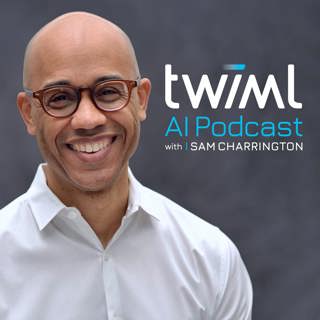
Multimodal, Multi-Lingual NLP at Hugging Face with John Bohannon and Douwe Kiela - #589
In this extra special episode of the TWIML AI Podcast, a friend of the show John Bohannon leads a jam-packed conversation with Hugging Face’s recently appointed head of research Douwe Kiela. In our conversation with Douwe, we explore his role at the company, how his perception of Hugging Face has changed since joining, and what research entails at the company. We discuss the emergence of the transformer model and the emergence of BERT-ology, the recent shift to solving more multimodal problems, the importance of this subfield as one of the “Grand Directions'' of Hugging Face’s research agenda, and the importance of BLOOM, the open-access Multilingual Language Model that was the output of the BigScience project. Finally, we get into how Douwe’s background in philosophy shapes his view of current projects, as well as his projections for the future of NLP and multimodal ML. The complete show notes for this episode can be found at twimlai.com/go/589
29 Aug 202253min

Synthetic Data Generation for Robotics with Bill Vass - #588
Today we’re joined by Bill Vass, a VP of engineering at Amazon Web Services. Bill spoke at the most recent AWS re:MARS conference, where he delivered an engineering Keynote focused on some recent updates to Amazon sagemaker, including its support for synthetic data generation. In our conversation, we discussed all things synthetic data, including the importance of data quality when creating synthetic data, and some of the use cases that this data is being created for, including warehouses and in the case of one of their more recent acquisitions, iRobot, synthetic house generation. We also explore Astro, the household robot for home monitoring, including the types of models running it, is running, what type of on-device sensor suite it has, the relationship between the robot and the cloud, and the role of simulation. The complete show notes for this episode can be found at twimlai.com/go/588
22 Aug 202236min

Multi-Device, Multi-Use-Case Optimization with Jeff Gehlhaar - #587
Today we’re joined by Jeff Gehlhaar, vice president of technology at Qualcomm Technologies. In our annual conversation with Jeff, we dig into the relationship between Jeff’s team on the product side and the research team, many of whom we’ve had on the podcast over the last few years. We discuss the challenges of real-world neural network deployment and doing quantization on-device, as well as a look at the tools that power their AI Stack. We also explore a few interesting automotive use cases, including automated driver assistance, and what advancements Jeff is looking forward to seeing in the next year. The complete show notes for this episode can be found at twimlai.com/go/587
15 Aug 202243min

Causal Conceptions of Fairness and their Consequences with Sharad Goel - #586
Today we close out our ICML 2022 coverage joined by Sharad Goel, a professor of public policy at Harvard University. In our conversation with Sharad, we discuss his Outstanding Paper award winner Causal Conceptions of Fairness and their Consequences, which seeks to understand what it means to apply causality to the idea of fairness in ML. We explore the two broad classes of intent that have been conceptualized under the subfield of causal fairness and how they differ, the distinct ways causality is treated in economic and statistical contexts vs a computer science and algorithmic context, and why policies are created in the context of causal definitions are suboptimal broadly. The complete show notes for this episode can be found at twimlai.com/go/586
8 Aug 202237min

Brain-Inspired Hardware and Algorithm Co-Design with Melika Payvand - #585
Today we continue our ICML coverage joined by Melika Payvand, a research scientist at the Institute of Neuroinformatics at the University of Zurich and ETH Zurich. Melika spoke at the Hardware Aware Efficient Training (HAET) Workshop, delivering a keynote on Brain-inspired hardware and algorithm co-design for low power online training on the edge. In our conversation with Melika, we explore her work at the intersection of ML and neuroinformatics, what makes the proposed architecture “brain-inspired”, and how techniques like online learning fit into the picture. We also discuss the characteristics of the devices that are running the algorithms she’s creating, and the challenges of adapting online learning-style algorithms to this hardware. The complete show notes for this episode can be found at twimlai.com/go/585
1 Aug 202244min

Equivariant Priors for Compressed Sensing with Arash Behboodi - #584
Today we’re joined by Arash Behboodi, a machine learning researcher at Qualcomm Technologies. In our conversation with Arash, we explore his paper Equivariant Priors for Compressed Sensing with Unknown Orientation, which proposes using equivariant generative models as a prior means to show that signals with unknown orientations can be recovered with iterative gradient descent on the latent space of these models and provide additional theoretical recovery guarantees. We discuss the differences between compression and compressed sensing, how he was able to evolve a traditional VAE architecture to understand equivalence, and some of the research areas he’s applying this work, including cryo-electron microscopy. We also discuss a few of the other papers that his colleagues have submitted to the conference, including Overcoming Oscillations in Quantization-Aware Training, Variational On-the-Fly Personalization, and CITRIS: Causal Identifiability from Temporal Intervened Sequences. The complete show notes for this episode can be found at twimlai.com/go/584
25 Jul 202239min

Managing Data Labeling Ops for Success with Audrey Smith - #583
Today we continue our Data-Centric AI Series joined by Audrey Smith, the COO at MLtwist, and a recent participant in our panel on DCAI. In our conversation, we do a deep dive into data labeling for ML, exploring the typical journey for an organization to get started with labeling, her experience when making decisions around in-house vs outsourced labeling, and what commitments need to be made to achieve high-quality labels. We discuss how organizations that have made significant investments in labelops typically function, how someone working on an in-house labeling team approaches new projects, the ethical considerations that need to be taken for remote labeling workforces, and much more! The complete show notes for this episode can be found at twimlai.com/go/583
18 Jul 202247min

Engineering an ML-Powered Developer-First Search Engine with Richard Socher - #582
Today we’re joined by Richard Socher, the CEO of You.com. In our conversation with Richard, we explore the inspiration and motivation behind the You.com search engine, and how it differs from the traditional google search engine experience. We discuss some of the various ways that machine learning is used across the platform including how they surface relevant search results and some of the recent additions like code completion and a text generator that can write complete essays and blog posts. Finally, we talk through some of the projects we covered in our last conversation with Richard, namely his work on Salesforce’s AI Economist project. The complete show notes for this episode can be found at twimlai.com/go/582
11 Jul 202246min





















